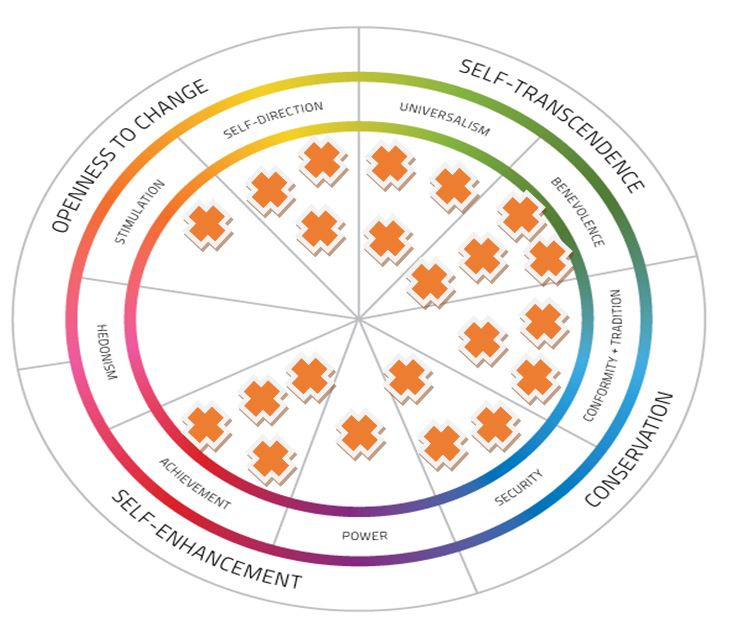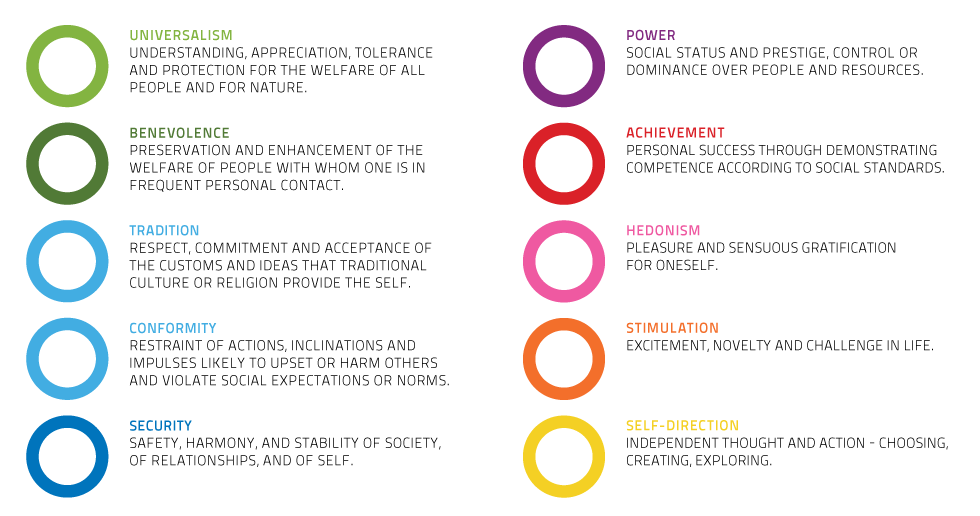Climate change is one of the major concerns of the modern age. The high level of globalisation, industrialisation, and rise of global corporations promoted the increased topicality of the topic and its transformation into a shared problem that should be addressed by governments, organisations, and companies. It means that business has become part of the problem and should also accept responsibility for trying to find an appropriate resolution for it (Crane & Matten, 2016). However, the successful transformation of companies and acceptance of sustainability issues are linked to values shared within the organisations, employees, and top managers. It means that the individuals’ perception of the problem and their attitude to it play a central role in action on climate change.
The critical importance of appropriate values can be explained by their correlation with the ethics, responsibility, and sustainability (ERS) issues. For instance, accepting responsibility for the results of a specific activity requires authority, confidence, and the correct understanding of the existing environmental issues (DesJardins & McCall, 2014). Adopting sustainability ideas within any business requires strong leadership values, power, and achievement; otherwise, there is a high risk of failure (Dunphy & Benn, 2006). That is why it is possible to state that values are fundamental for understanding the necessity for change and making it part of everyday activities (Schaefer et al., 2020). They help to make sense of the environmental activities and devote attention to them.
From another perspective, appropriate values can help to resolve a complex sensemaking challenge linked to the action on climate change. The problem is that regardless of the fast deterioration of the environment, climate change remains a disputable issue. Some individuals and organisations prefer to disregard ethical issues (Singer, 2005). Others view it as an insignificant factor or part of the world. This attitude is dangerous and might result in the critical deterioration of the environment. Thus, climate change and boundaries of human activity are closely linked to values shared by individuals at different levels (Rockström et al., 2009). The readiness to accept responsibility for different types of pollution resulting from business activity emerges from the appropriate attitudes and understanding.
Finally, individuals’ values can be viewed as motivators promoting positive change and highlighting the necessity of action. Numerous authors admit that a leader’s power, achievement, and creativity might serve as the central factors cultivating the reconsideration of individuals’ attitudes to the existing problems and guaranteeing their readiness to engage in sustainability activities and actions (Albani & Henderson, 2014; Bendell, 2020). It becomes vital to cultivate a particular organisational culture characterised by specific ethics and shared values, helping to address the nagging problem and resolve it through a collaborative effort (Howard-Grenville et al., 2014). From this perspective, values should be considered the foundation of the climate action and help to make sense of ERS.
Altogether, climate change is one of the most critical issues of the modern age. Its addressing requires a collaborative effort because of the scope of the challenge and numerous factors affecting it. For this reason, it is vital to outline and cultivate the values necessary for supporting sustainable ideas and making them part of the business organisations’ activity. It will help to resolve the main sensemaking challenge and guarantee employees, managers, and CEOs are engaged in action on climate and are ready to cooperate the find an effective resolution to the problem.

I believe that my ethical journey started in my early childhood, as the values are formed by parents and family. I acquired the ideas of good and bad things and the basic principles of socially accepted behaviour. At the same time, I was inspired by nature and its beauty. However, these basic ideas were radically transformed after my studying and the improved understanding of how the world functions and the problems it faces. At the moment, I think that my ethical journey continues, and I have reached a critical point. I realize that the problems of climate change and environmental pollution cannot be disregarded.
The photo above is relevant to me as it reflects my concerns and worries. I have seen beaches polluted by plastic waste; however, this image represents the true scope of the problem. Thousands of tons of plastic impact people’s health globally, promote climate change and make animals suffer. It means that the issue should be resolved; however, it requires a collaborative effort. For this reason, it is vital to cultivate specific values among broad populations and ensure they are engaged in the process. Otherwise, it is impossible to attain success and promote positive change.
Questions based on the ‘individual level marker values’ of the Schwartz Value System (SVS)
What’s in it for me? (Self-enhancing)
Concern for others (self-transcendence)
Protecting how things are (conservation)
Openness to Change
Schwartz Circumplex Model
The model shows that hedonism and stimulation are not important to me. At the same time, other spheres and values, such as universalism, benevolence, and achievement are critical and shape my actions and behaviours.


References
Albani, M., & Henderson, K. (2014). Creating partnerships for sustainability. McKinsey. Web.
Bendell, J. (2020). In the company of rebels. In D. Murphy and A. Marshall (Eds.), Citizenship and sustainability in organizations (pp. 110-125). Routledge.
Crane, A., & Matten, D. (2016). Business ethics (4th ed.). Oxford University Press.
DesJardins, J., & McCall, J. (2014). Contemporary issues in business ethics (6th ed.). Cengage Learning.
Dunphy, D., & Benn, S. (2006). Corporate governance and sustainability: Challenges for theory and practice. Routledge.
Howard-Grenville, J., Buckle, S., Hoskins, B., & George, G. (2014). Climate change and management: From the editors. Climate Change and Management, 57(3), 615-623. Web.
Rockström, J., Steffen, W., Noone, K., Persson, A., Chapin, F. S., 3rd, Lambin, E. F., Lenton, T. M., Scheffer, M., Folke, C., Schellnhuber, H. J., Nykvist, B., de Wit, C. A., Hughes, T., van der Leeuw, S., Rodhe, H., Sörlin, S., Snyder, P. K., Costanza, R., Svedin, U., Falkenmark, M., … Foley, J. A. (2009). A safe operating space for humanity. Nature, 461(7263), 472–475. Web.
Schaefer, A., Williams, S., & Blundel, R. (2020). Individual values and SME environmental engagement. Business & Society, 59(4), 642–675. Web.
Singer, P. (2005). Ethics and intuitions. The Journal of Ethics, 9(3/4), 331–352. Web.
Sporrer, A. (2022). 175 nations endorse resolution to end plastic pollution. American Shipper. Web.